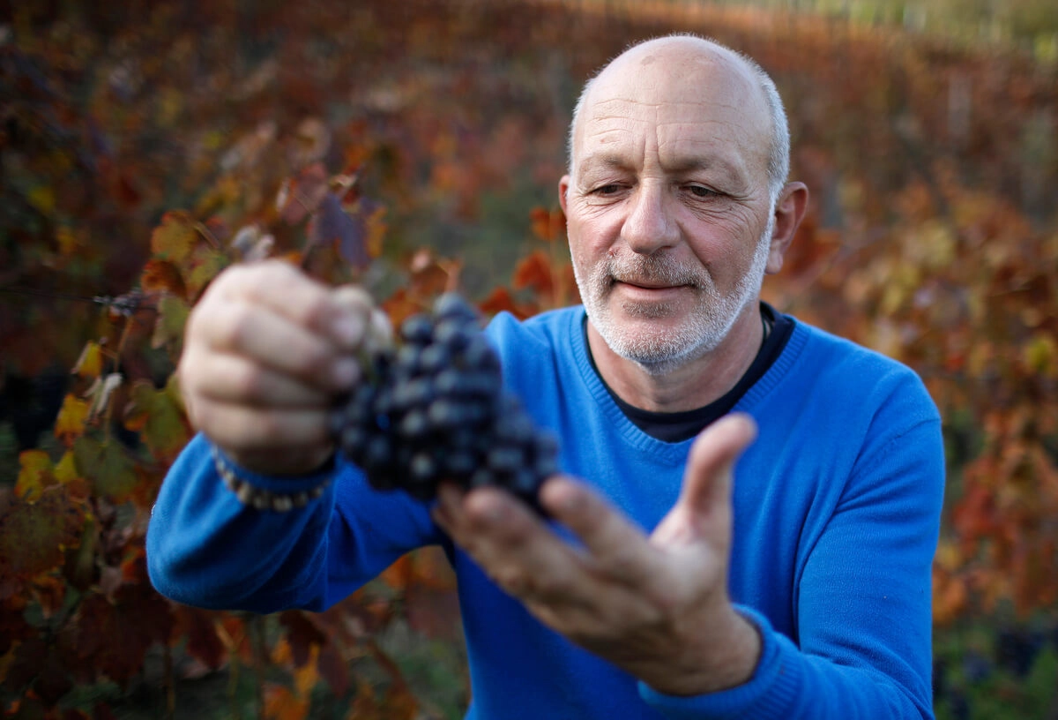
Organic winemaker in Lechkhumi wows international markets
Mystical Khvamli (Khomli) Mountain stands in the western part of Georgia, in Lechkhumi. Legends say this is the mountain where the Greek god Zeus chained Prometheus for giving people the gift of fire. Historic sources say that this is also where the treasures of Georgian kings were hidden. Today, the slopes of this mountain are also home to a vineyard producing high-quality, premium organic Qvevri wines using Georgia’s ancient traditional methods.
Tamaz Omanadze grew up watching the sunrise on Khomli Mountain, which for a young boy seemed mystical and unreachable. Today, Khomli is the name of the wines his vineyard produces. In 2010, Omanadze founded Khomlis Marani and, together with Sergo and David Arjevanidze, started cultivating the vineyard by hand, without any machinery. Nature here offers the perfect conditions: in late spring, during those cold, frosty mornings, the cold air flows down into the valley, leaving the slopes warmer and sparing the grape buds from frost.
When he was younger, Omanadze often thought about ecology and saving nature. In 2017, his company was awarded a bio-certificate and he started producing organic wines, free of chemicals. He started selling organic wines in local shops. From there Khomlis Marani bottles travelled to high-level diplomatic meetings at the presidential palace in Tbilisi.
Omanadze’s wine soon became a leader among the 10 most expensive Georgian wines. The winemaker produced Lechkhumi Green Tsolikouri, semi-sweet Qvevri Usakhelouri and Mshrali Usakhelouri, as well as Bio Usakhelouri Chacha. Today, Khomlis Marani is the only Georgian company that makes bio-certified Usakhelouri wine in qvevri, the traditional Georgian clay pitcher. In fact, it’s the only organic wine producer in Western Georgia.
“My initial goal was to achieve success in my own country first, in the cradle of vines and grapes, and then start selling internationally,” explains Omanadze. “But just as we established our brand and were ready to brave the world market, the pandemic started.”
The pandemic presented challenges for many businesses, including Khomli’s Marani, but the reopening process came with new opportunities. Khomli’s Marani acquired new equipment with the support for the EU as part of its EU4Business Initiative, Sweden and Austria in the frame of the GRETA project and managed to improve the operational process of the winemaking. Furthermore, he received marketing support to promote well established bio-wine products to the international market.
“Receiving this equipment meant less physical labour for me, personally,” explains Tamaz Omanadze. “I saved time and money and used that money for other important aspects of our work.”
Meanwhile, Mr. Tamaz was contacted by a British company ordering 150 bottles of his wine and exported them to the UK. In just three months, Georgian wines were presented for degustation at the Hedonism Wines, a fine wine, whisky and spirits boutique with over 8,000 products on its shelves. Omanadze’s wine sold there for the hefty price of over £800 a bottle!
“Our wine has not reached the Royal Family’s table yet, but it has been appreciated in royal circles,” says Omanadze with pride.
Georgia is famous of its wine culture and is considered of the homeland of the Qvevri wine. The support to Georgian SMEs from the EU, Sweden and Austria is essential to promote not only the businesses on starting phase but also well-established Georgian brands. The final objective is to build the sustainable business environment and create new income opportunities for high mountain regions of Georgia.
***
GRETA | Green Economy: Sustainable Mountain Tourism and Organic Agriculture in Georgia’ is supported by the European Union, Austria and Sweden, and is implemented in Georgia by the Austrian Development Agency. The project aims to facilitate the improvement of the business environment and increase opportunities for generating additional income for the Georgian economy in two important sectors, mountain tourism and organic agriculture. The project is implemented in close cooperation with the local government and involves the regions of Samegrelo-Zemo Svaneti, Racha-Lechkhumi-Kvemo Svaneti and upper Imereti, where the entrepreneurs are involved from the municipalities of Mestia, Lentekhi, Tsageri, Oni, Ambrolauri, Sachkhere, Chiatura and Tkibuli. Those interested can obtain full information from the project web page – www.gretaproject.ge